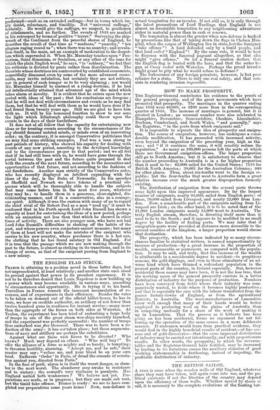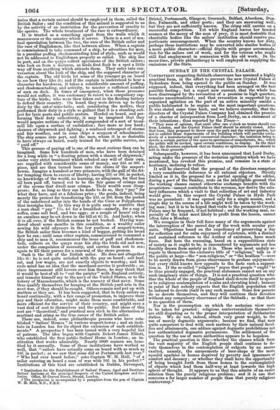THE BRITISH SAILOR.
A TIME is come when the wooden walls of Old England, whatever share they may have taken, will again come into use, and the po- litical existence if not the liberties of the country may depend upon the efficiency of those walls. Whether moved by steam or sail, it is necessary to the complete evolutions of the floating bat-
teries that a certain animal should be employed in them, called the British Sailor ; and the condition of this animal is suggested to us by the activity of an institution for the prevention of cruelty to the species. The whole treatment of the race is extraordinary. It is treated as a something apart from the walls which it mancenvres or the country which it serves. There is a sort of mu- tual speculation between the two, the race of the British sailor and the race of Englishmen, like that between aliens. When a captain is commissioned to take command of a ship, he advertises for men, in a peculiar puffing rhodomontading kind of style, such as would not be addressed to Englishmen properly so called. The ship lies in port, and on the quays collect specimens of the British sailors; who look on from a distance, as birds first flock to a spot a littl way off from anything which attracts them. They enter into con- versation about the look of the ship, and the supposed character. of the captain. The old birds let some of the younger go on board to see how they like it; and if the captain is understood to bear a character for harshness, it takes a considerable amount of puffing, and rhodomontading, and activity, to muster a sufficient number of men on deck. In times of emergency, when these processes would not suffice, it was customary to resort to a compulsory cap- ture of the birds; who were then taken out in the floating battery to defend their country. On board they were driven up to their duty by the cat-o'-nine-tails ; and, considering the motive, they performed their duty in a style so gallant that it is a standing sub- ject for lyric poets and public, orators. Herded on board, and per- forming their duty collectively, it may be imagined that they would acquire notions of the world compounded of a sort of tread- mill life upon a surface of undulation ; fare more or less bard; chances of shipwreck and fighting ; a confused retrospect of storms and fair weather, and in some ships a soupcon of schoolmaster. The ship comes into port, and the men, whom it is so desirable to have always on board, ready trained for the public service, are " paid off." This process of paying off is one of the most curious than can be imagined. Some few hundreds of men, who have been detained for a long while in " a floating prison with a chance of shipwreck," under very strict treatment which rebuked any will of their own, are supplied with considerable sums of money, say 251. or 301. a piece, and are then turned loose into the slums of the seaport- towns. Imagine a hundred or two prisoners, with the gall of the fet- ter tempting them to excess of liberty, having 251. or 301. in pocket, no knowledge of the world, no learning, no allegiance, for that has all been paid off, turned out to be the fair game of crimps and of the syrens that dwell near crimps. Their wealth soon disap- pears; foras long as they can be made to do so, they " pay " for what they have, and at a fabulous price ; the goods, indeed, being merely the pretext for transferring the 251. or 301. from the pocket of the unlettered sailor into the hands of the Circe or Polyphemus that inveigles him. In this way it is quite easy to contrive that a man shall " ay" 17s. 4d. for a breakfast—namely, for a cup of coffee, some salt beef, and two eggs ; or a couple of hours' ride in an omnibus may be set down in the bill at 61.28. And lucky, when it is all over, if the British seaman be not barked. Having wan- dered about some months in this condition, as a wealthy sailor sowing his wild odysseys in the low purlieus of seaport-towns, the British sailor then becomes a kind of beggar, getting his bread how he can; until some other captain, commissioned to command a ship and to man it, recommences the issue of puff and rhodomon- tade, collects on the quays near his ship the birds old and new, under the compulsion of necessity, and carries them out to sea; again to fill their purses for a renewal of the shore process.
Such is the life of the British sailor. He does not altogether like it : he is not quite satisfied with the pay on board ; salt beef, oat, and low wages, are not exactly objects to worship ; and his rode mind has an idea that the merchant-service is preferable ; or, since impressment still hovers over him there, he may think that it would be best of all to "cut the painter" with England entirely, and transfer himself say to the navy of the United States, or to the fishery of Massachusetts, which is the nursery of that navy. Some thus qualify themselves for hanging at the British yard-arm in the next war, if they should be caught. Others remain and put up with matters as they are. It has been suggested, that to keep sailors on board continually, with a fair range of promotion, to improve their pay and their education, might make them more comfortable, and more efficient for the service of their country, and might save a vast deal of cost to themselves and the public. But ideas of this sort are " theoretical," and practical men stick to the alternation of martinet and orimp as the true career of the British sailor.
There are, indeed, some philanthropic persons who have esta- blished " Sailors' Homes " in various seaport-towns ; and an insti- tute in London has for its object the extension of such establish- ments.° A prospectus t has been issued with a very hopeful list of patrons. The idea began with Captain Robert James Elliott, who established the first public Sailors' Home in London ; an in- stitution that works admirably. Nearly 5000 seamen are. _bene- fited by it annually. Some of these institutions have worked so well, that " sailors have actually come on board with as much as 101. in pocket ; as we saw that some did at Portsmouth last year." " Who had ever heard before," asks Captain W. H. Hall, " of a sailor entering on board a man of war with 101. in his pocket ? " Institutions of this kind are established in Dublin, Devonport,
* Institution for the Establishment of Sailors' Homes, Aged and Destitute Sailors' Asylums at the principal Seaports of the United Kingdom and Co- lonies. Office, 3.5 Craven Street, Strand, London.
t Theprospectus is accompanied by a pamphlet from the pen of Captain W. H. Hall R.N., F.H.B. Bristol, Portsmouth, Glasgow, Greenock, Belfast, Aberdeen, Dun- dee' Falmouth, and other ports ; and they are answering well ; but they are not sufficiently known. The crimp still carries on a successful competition. Yet while England leaves her boasted seamen at the mercy of the men of prey, it is most desirable that charitable bodies like the sailors' institution should receive pro- portionate encouragement. When the country knows her duty, perhaps these institutions may be converted into similar bodies of a more public character—official depots with proper accommoda- tion for the sailors out of work, and for the veteran who might still find employment in connexion with his old work. In the mean time, private philanthropy is well employed in supplying the omissions of the State.



























 Previous page
Previous page